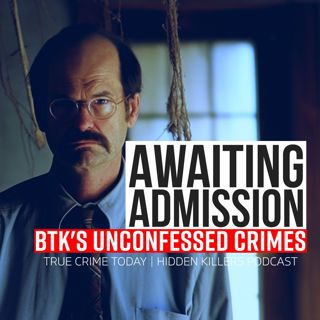
What Will NEW Evidence from BTK Tell Us About Past Crimes?
Jaksokuvaus
A recent episode of the podcast "Hidden Killers" featured a discussion with retired FBI Special Agent and Chief of the Counterintelligence Behavioral Analysis Program, Robin Dreeke, on the newly discovered evidence in Park City, Kansas, linked to serial killer Dennis Rader. The hosts questioned Dreeke about the implications of the recent discovery of a 'Heidi hole' in Rader's old property and what it may mean for the ongoing investigation into his crimes. Dennis Rader, notoriously known as the BTK (Bind, Torture, Kill) killer, was apprehended in 2005 after a series of murders spanning several decades. It is known that Rader kept 'trophies' from his victims, which he stored in hiding places he referred to as 'Heidi holes.' Although his house was torn down about 15 years ago, a new 'Heidi hole' was recently uncovered in the area where a shed once stood on his property. This particular hiding spot, covered in dirt and concealed beneath wood and shingles, contained items believed to be trophies and pieces of evidence from his heinous crimes. Dreeke offered insight into the mind of a serial killer, suggesting that Rader might have buried these items after exhausting their fantasy value but did not want to completely discard them due to emotional attachment. "It's his addiction and his fantasy. And I think he just exhausted the usefulness of those items for his fantasy world and moved on to new ones, but he didn't want to totally get rid of them because he's emotionally attached to them," Dreeke said. This recent discovery raises questions about whether Rader intended to lead authorities to this hidden cache of evidence or whether it was meant to remain undiscovered. His daughter, Carrie, pointed the authorities in the direction of the shed, leading to the unearthing of the hidden items. Dreeke speculated that Rader did not plan that far into the future, nor did he ever envision himself getting caught. "They plan on how not to get caught. That, you know, they don't plan for after they're caught. They plan to do things about not being caught. So that's the way I again, 'cause that is more in the present. More in the now," he added. Moreover, Dreeke suggested that Rader might leverage the situation for attention, as he is already serving multiple life sentences and has nothing to lose. "He's probably doing back flips in, there's psychological back flips saying, wow, I'm back in the game. Look at this. And just keep denying it. Why not? Because part of that grandiosity is not the number of people you've killed at this point. I think it's the attention he's getting," Dreeke explained. As investigations continue and more evidence surfaces, it remains to be seen what impact this new discovery will have on our understanding of the mind of a serial killer and the extent of Rader's crimes. Nonetheless, this conversation with Robin Dreeke provides a fascinating glimpse into the complexities of criminal psychology and the ongoing quest for justice for the victims of these heinous acts. Want to listen to ALL of our podcasts AD-FREE? Subscribe through APPLE PODCASTS, and try it for three days free: https://tinyurl.com/ycw626tj Follow Our Other Cases: https://www.truecrimetodaypod.com The latest on Catching the Long Island Serial Killer, Awaiting Admission: BTK’s Unconfessed Crimes, Chad & Lori Daybell, The Murder of Ana Walshe, Alex Murdaugh, Bryan Kohberger, Lucy Letby, Kouri Richins, Justice for Harmony Montgomery, The Murder of Stephen Smith, The Murder of Madeline Kingsbury, and much more! Listen at https://www.truecrimetodaypod.com